Books by Ricardo Miguel Falcão

This book is the product of the Seminar MAP-FGM (https://mapfgm.eu, Rome, 24-25 Nov. 2017), where... more This book is the product of the Seminar MAP-FGM (https://mapfgm.eu, Rome, 24-25 Nov. 2017), where anthropologists, sociologists, philosophers, exponents of NGO, gynaecologists and jurists exchanged their knowledge by pursuing several aims: re-introducing the FGM/C issue inside an anthropological framework, seeking to widen the theme to body modifiability, not only women’s bodies, and proceeding from historicization and the acknowledgment of subjectivities; criticising the biomedical approaches, as other forms of criminalization, examining the connection with the other disciplines and their knowledge potential; finally, opening the issue to uncommon geographical fields, both in Africa and Asia. The main objective has been establishing the conditions for building a socio-ethno-anthropological gaze on the social gender constructions and on the biopolitics on/of the bodies, by making emerge the strengths but, most of all, the weaknesses, of the medical and regulatory gazes, which, on their part, call into question an anthropological vocabulary which does not pertain to them, and risk to produce effects opposed to the ones wished, that is the abandonment of these practices.
With contributions of: Omar Abdulcadir, Jean-Loup Amselle, Esther Ayuk, Franca Bimbi, Lucrezia Catania, Giovanna Cavatorta, Gily Coene, Ricardo Falcão, Michela Fusaschi, Irwan Hidayana, Sara Johnsdotter, Bianca Pomeranzi, Ismail Sougueh Guedi and Michela Villani.

Female Genital Mutilation/Cutting: Institutional Integrated Responses - Proceedings of the III MAP-FGM International Seminar, 2018
This volume is a collection of some of the contributions presented at the 3rd International Confe... more This volume is a collection of some of the contributions presented at the 3rd International Conference of the Multisectoral Academic Programme to Combat and Prevent Female Genital Mutilation, entitled “Integrated Institutional Responses to FGM/C.” The conference was held in Lisbon on September 28 and 29, 2017 at Instituto Universitário de Lisboa (ISCTE-IUL). The conference was organized by Centro de Estudos Internacionais (CEI-IUL), one of the research units of ISCTE-IUL and partner in the International MAP-FGM Consortium led by Universidad Rey Juan
Carlos I. The conference planning was coordinated by Professor Clara Carvalho and led by project manager and researcher Ricardo Falcão, alongside research fellow Marta Patrício. It was the third of four International Conferences planned to address the subject of FGM/C in the framework of this project.
Interactive manual to teach on FGM/C in different disciplines at the University.
Exists in Engli... more Interactive manual to teach on FGM/C in different disciplines at the University.
Exists in English, Spanish, Dutch, Italian, Portuguese and Catalan.
Download from: www.mapfgm.eu
Guía formativa multisectorial para la inserción del tema de la A/MGF en los programas universitar... more Guía formativa multisectorial para la inserción del tema de la A/MGF en los programas universitarios de medicina, enfermería, trabajo social, educación, derecho, criminología, comunicación, antropología y estudios feministas y de género.
Publicada en seis idiomas (inglés, italiano, portugués, castellanom, catalán y flamenco)
Ver: www.mapfgm.eu
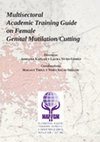
The Multisectorial Academic Program to prevent and combat Female
Genital Mutilation (MAP-FGM) is ... more The Multisectorial Academic Program to prevent and combat Female
Genital Mutilation (MAP-FGM) is aimed to contribute to the defence of women’s human rights, including their sexual and reproductive rights, by the preventive multidisciplinary intervention of the practice and the effective protection of the girls at risk. The MAP-FGM Project, co-financed by the European Commission, constitutes an innovative biannual rogram that aims to raise awareness and to prepare future professionals of different fields and specialities that may, in the future, be in contact with populations coming from countries that practice FGM/C.
(...)
The Academic Training Guide is destined to promote and facilitate the
incorporation of academic content about FMG/C in different university degrees such as medicine, nursing, education, psychology, social work, law, criminology, anthropology, international cooperation for development, gender and feminist studies, communication and journalism. The Guide has been drafted by teaching and research staff from different disciplines connected to the Rey Juan Carlos University, the Autonomous University of Barcelona, the Rome Tre University,
the University Institute of Lisbon and the Vrij Universiteit Brussel, and experts from two specialized foundations with an ample trajectory in the intervention field (Wassu-UAB Foundation and Angello Celli Foundation).
The aim of the Guide is to offer, in a structured and accessible way, teaching contents for the training of future professionals that can play a key role in the prevention and abandonment of the practice and the assistance to women and girls. In that sense, it can be useful to the university teaching staff, to the academic authorities or to the students interested in acquiring academic and professional knowledge specialized on the subject. Its multisector character derives from the participation of authors coming from different disciplines, with various conceptual and epistemological focuses. The plurality of perspectives gathered
in this guide reflect the intensity of academic debates and the complexity of the theoretical and practical dilemmas that the abandonment of the FGM/C poses, both in the countries of origin and in hosting countries.
Book Chapters by Ricardo Miguel Falcão

This paper is part of an ongoing research on Sexual and Reproductive Rights in West Africa, with ... more This paper is part of an ongoing research on Sexual and Reproductive Rights in West Africa, with a particular focus in Senegal. It starts with the assumption that the body is a signifier of local social and moral worlds, and also that it is through the body that experiences of freedom and autonomy, violence, social pressure and inequality are manifested. Individuals are socially situated through their gender but gender representations are disputed by social actors, endogenous and exogenous. The claims for social change concerning FGM/C envisions an abandonment of the practice as part of a social project that isn't always shared with practicing communities in the same lines as those set by stakeholders. Political and activist mobilisation often fails to antecipate backlashes. With this paper I want to claim that we have to cast a wider view on gender inequality, social values and norms, because both practicing and non-practicing communities share cultural representations that fuel an overepresentation of femininity, female sexuality and the female body and its link to social order and morality.

African Realities: Body, Culture and Social Tensions, Aug 1, 2014
Senegalese youth have a negative status and are accused of being prone to a scanda... more Senegalese youth have a negative status and are accused of being prone to a scandalous sexualised behaviour. This negative status surpasses simple contextual meanings. This status is a consequence of a long-standing historical questioning of social values in Senegal. At the heart of this negative status of youth is the “body”, in more than one dimension, through its sexuality, through patterns of consumption, and through its mediatisation. What I will consider in this article is the appropriation by Senegalese youth of their bodies, and especially of their erotic dimensions. I will try to explore how this appropriation is also materialised through and with ITCs, which represent for this youth a new “technicity of relationality” and a mirror, where their self-reflection can be scrutinised and fashioned. The eruption of youth sexuality in the public sphere has brought concerns to a society in which open talks on sexuality are a taboo. Society insistently denounces its malaise with many of the
practices of the body claimed by youth as their modern identity, without seemingly being able to counter them, neither materially nor ideologically, stressing a visible social tension between generations. These practices are
clearly antagonistic to a rhetoric of a legitimate “tradition” (coosan), embedded in religious Islamic ethos, and presented by my interlocutors as: a) an expectation on the regulation of behaviours; b) a substitute for
problematic parenting; c) a pillar against individualisation; d) the fixation of values against Western influence; and also for some, especially to youth, as e) a constraint.
Thesis by Ricardo Miguel Falcão
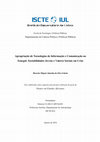
The generalisation of Information and Communication Technologies in the world gains momentum also... more The generalisation of Information and Communication Technologies in the world gains momentum also in Africa, in countries such as Senegal. The appropriation of ICT promotes new social dynamics, in communications, economies, circulation of ideas, and has been considered important in new forms of political participation and new models for business. But ICT, through their ability to represent the world and communication, participate also in important changes in sociabilities. In Senegal, we observe social tensions in gender and intergenerational relations, that have become apparent by a new regime of exposure of social relations and exacerbated by these technologies. A patriarchal ideology considers the openness to the world and to new cultural references problematic.
The fear of cultural alienation sustains the perception of a crisis in social values. This thesis aims at questioning the dialectics between this fear and the liberating potential of ICT, by considerind the instances where social tensions are observable, namely on feminine sociabilities, linked to the body and sexuality, to public and private spaces, to generational practices and to youth, their aspirations and place in society. The crisis in social values is here thought of as an ideological construction based on a difuse and disproportionate moral panic, symptomatic of a crisis in masculinities.
The analysis on the codifications of gender relations, family, conjugal, generational and neighbourly relations, configures the shift from an object centered in TIC to another one centered on the influence of TIC in social relations.
Papers by Ricardo Miguel Falcão
Senegalese youth has a negative status and is accused of being prone to a scandalous sexual behav... more Senegalese youth has a negative status and is accused of being prone to a scandalous sexual behavior. This negative status surpasses simple contextual meanings, it is consequence of
a long-standing questioning of social values. At the heart of this negative status of youth is the «body», in more than one dimension, through its sexuality, through patterns of consumption, through its mediatization. What I will consider in this paper is the appropriation by senegalese youth of their bodies, their appropriation of ICTs, and try to understand how these are at the crossroad between social tensions and new relational standards, new expectations on sexuality, pleasure, family.
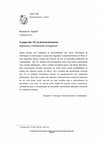
Alguns estudos têm enfatizado as potencialidades das novas Tecnologias de Informação e Comunicaçã... more Alguns estudos têm enfatizado as potencialidades das novas Tecnologias de Informação e Comunicação e o papel das migrações no desenvolvimento em África. A veia pragmática desses estudos tem deixado de fora as dimensões subjectivas da «apropriação» das TIC, olhadas instrumentalmente como chave para a participação num «mundo globalizado», onde o modelo neo-liberal parece não deixar alternativa. Esta comunicação pretende apresentar de forma crítica outras possibilidades de análise dos sistemas sociais, em África, com o exemplo das apropriações efectivas das TIC no Senegal. Pretende-se através do questionamento dos imaginários globalizados, olhar para o papel dos migrantes «transnacionais» enquanto detentores de um novo poder social, que por um lado contribui para a generalização da tecnologia e, por outro, se assume como modelo de sucesso social e económico, contribuindo para a «mediatização da sociedade», alimentando aspirações colectivas e o «desejo de partida».
Other by Ricardo Miguel Falcão
This is an essay on the epistemology and ontology of both African Studies and Anthropology. Due t... more This is an essay on the epistemology and ontology of both African Studies and Anthropology. Due to my current enrollment in a Phd in African Studies and my past formation in Anthropology i intended to discuss certain issues on the epistemological background of both fields I'm looking upon at the moment. It's not an exhaustive paper but rather the questioning of the crossing between the "colonial science" anthropology once was and the emergence of a "post-colonial" field like African Studies, with it's roots well firmed in colonial institutions and rationality. Inter-, A-, and Trans-disciplinarity have long been an issue to the scholars that take african issues into hand.
Conference Presentations by Ricardo Miguel Falcão

When African States like Senegal ratify international human rights treaties and supposedly new in... more When African States like Senegal ratify international human rights treaties and supposedly new instruments of protections for vulnerable groups become available, the steps taken in the sense of increasing individual rights are seen as socially progressive.
The rate of ratification of such instruments has been high in the country, to such an extent that certain people state that Senegal is a country of human rights. Gender rights and sexual and reproductive rights have been widely promoted both at the governmental level and the grassroots level, but not those of LGBTQ people.
The rights of LGBTQ contrast absolutely with this scenario and violence upon people belonging in this category is very common. Public humilliation, social commentary made by local personalities and high profile religious leaders, and at times even fortright violence like lynching, are outcomes of a very stressed relation of senegalese society with non-normative sexual identities, especially homosexuality.
The country, seen as a “good student” in human rights is at the bottom of the scale of respect for the rights of LGBTQ people. Despite the pressure from the international community for the country pass new laws, it has stood ground, choosing as the interlocutors of the political debate religious groups of pressure and society at large. This ‘non-compliance’ stance can be explained by looking further into the social context under appreciation.
This communication will explore the general framework of gender and intergenerational relations, as well as provide examples, that will help to give meaning to why LGBTQ movements in Senegal haven’t been able to come through.





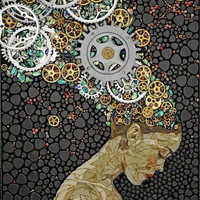
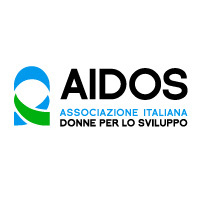

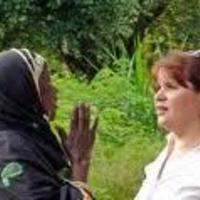
Uploads
Books by Ricardo Miguel Falcão
With contributions of: Omar Abdulcadir, Jean-Loup Amselle, Esther Ayuk, Franca Bimbi, Lucrezia Catania, Giovanna Cavatorta, Gily Coene, Ricardo Falcão, Michela Fusaschi, Irwan Hidayana, Sara Johnsdotter, Bianca Pomeranzi, Ismail Sougueh Guedi and Michela Villani.
Carlos I. The conference planning was coordinated by Professor Clara Carvalho and led by project manager and researcher Ricardo Falcão, alongside research fellow Marta Patrício. It was the third of four International Conferences planned to address the subject of FGM/C in the framework of this project.
Exists in English, Spanish, Dutch, Italian, Portuguese and Catalan.
Download from: www.mapfgm.eu
Publicada en seis idiomas (inglés, italiano, portugués, castellanom, catalán y flamenco)
Ver: www.mapfgm.eu
Genital Mutilation (MAP-FGM) is aimed to contribute to the defence of women’s human rights, including their sexual and reproductive rights, by the preventive multidisciplinary intervention of the practice and the effective protection of the girls at risk. The MAP-FGM Project, co-financed by the European Commission, constitutes an innovative biannual rogram that aims to raise awareness and to prepare future professionals of different fields and specialities that may, in the future, be in contact with populations coming from countries that practice FGM/C.
(...)
The Academic Training Guide is destined to promote and facilitate the
incorporation of academic content about FMG/C in different university degrees such as medicine, nursing, education, psychology, social work, law, criminology, anthropology, international cooperation for development, gender and feminist studies, communication and journalism. The Guide has been drafted by teaching and research staff from different disciplines connected to the Rey Juan Carlos University, the Autonomous University of Barcelona, the Rome Tre University,
the University Institute of Lisbon and the Vrij Universiteit Brussel, and experts from two specialized foundations with an ample trajectory in the intervention field (Wassu-UAB Foundation and Angello Celli Foundation).
The aim of the Guide is to offer, in a structured and accessible way, teaching contents for the training of future professionals that can play a key role in the prevention and abandonment of the practice and the assistance to women and girls. In that sense, it can be useful to the university teaching staff, to the academic authorities or to the students interested in acquiring academic and professional knowledge specialized on the subject. Its multisector character derives from the participation of authors coming from different disciplines, with various conceptual and epistemological focuses. The plurality of perspectives gathered
in this guide reflect the intensity of academic debates and the complexity of the theoretical and practical dilemmas that the abandonment of the FGM/C poses, both in the countries of origin and in hosting countries.
Book Chapters by Ricardo Miguel Falcão
practices of the body claimed by youth as their modern identity, without seemingly being able to counter them, neither materially nor ideologically, stressing a visible social tension between generations. These practices are
clearly antagonistic to a rhetoric of a legitimate “tradition” (coosan), embedded in religious Islamic ethos, and presented by my interlocutors as: a) an expectation on the regulation of behaviours; b) a substitute for
problematic parenting; c) a pillar against individualisation; d) the fixation of values against Western influence; and also for some, especially to youth, as e) a constraint.
Thesis by Ricardo Miguel Falcão
The fear of cultural alienation sustains the perception of a crisis in social values. This thesis aims at questioning the dialectics between this fear and the liberating potential of ICT, by considerind the instances where social tensions are observable, namely on feminine sociabilities, linked to the body and sexuality, to public and private spaces, to generational practices and to youth, their aspirations and place in society. The crisis in social values is here thought of as an ideological construction based on a difuse and disproportionate moral panic, symptomatic of a crisis in masculinities.
The analysis on the codifications of gender relations, family, conjugal, generational and neighbourly relations, configures the shift from an object centered in TIC to another one centered on the influence of TIC in social relations.
Papers by Ricardo Miguel Falcão
a long-standing questioning of social values. At the heart of this negative status of youth is the «body», in more than one dimension, through its sexuality, through patterns of consumption, through its mediatization. What I will consider in this paper is the appropriation by senegalese youth of their bodies, their appropriation of ICTs, and try to understand how these are at the crossroad between social tensions and new relational standards, new expectations on sexuality, pleasure, family.
Other by Ricardo Miguel Falcão
Conference Presentations by Ricardo Miguel Falcão
The rate of ratification of such instruments has been high in the country, to such an extent that certain people state that Senegal is a country of human rights. Gender rights and sexual and reproductive rights have been widely promoted both at the governmental level and the grassroots level, but not those of LGBTQ people.
The rights of LGBTQ contrast absolutely with this scenario and violence upon people belonging in this category is very common. Public humilliation, social commentary made by local personalities and high profile religious leaders, and at times even fortright violence like lynching, are outcomes of a very stressed relation of senegalese society with non-normative sexual identities, especially homosexuality.
The country, seen as a “good student” in human rights is at the bottom of the scale of respect for the rights of LGBTQ people. Despite the pressure from the international community for the country pass new laws, it has stood ground, choosing as the interlocutors of the political debate religious groups of pressure and society at large. This ‘non-compliance’ stance can be explained by looking further into the social context under appreciation.
This communication will explore the general framework of gender and intergenerational relations, as well as provide examples, that will help to give meaning to why LGBTQ movements in Senegal haven’t been able to come through.
With contributions of: Omar Abdulcadir, Jean-Loup Amselle, Esther Ayuk, Franca Bimbi, Lucrezia Catania, Giovanna Cavatorta, Gily Coene, Ricardo Falcão, Michela Fusaschi, Irwan Hidayana, Sara Johnsdotter, Bianca Pomeranzi, Ismail Sougueh Guedi and Michela Villani.
Carlos I. The conference planning was coordinated by Professor Clara Carvalho and led by project manager and researcher Ricardo Falcão, alongside research fellow Marta Patrício. It was the third of four International Conferences planned to address the subject of FGM/C in the framework of this project.
Exists in English, Spanish, Dutch, Italian, Portuguese and Catalan.
Download from: www.mapfgm.eu
Publicada en seis idiomas (inglés, italiano, portugués, castellanom, catalán y flamenco)
Ver: www.mapfgm.eu
Genital Mutilation (MAP-FGM) is aimed to contribute to the defence of women’s human rights, including their sexual and reproductive rights, by the preventive multidisciplinary intervention of the practice and the effective protection of the girls at risk. The MAP-FGM Project, co-financed by the European Commission, constitutes an innovative biannual rogram that aims to raise awareness and to prepare future professionals of different fields and specialities that may, in the future, be in contact with populations coming from countries that practice FGM/C.
(...)
The Academic Training Guide is destined to promote and facilitate the
incorporation of academic content about FMG/C in different university degrees such as medicine, nursing, education, psychology, social work, law, criminology, anthropology, international cooperation for development, gender and feminist studies, communication and journalism. The Guide has been drafted by teaching and research staff from different disciplines connected to the Rey Juan Carlos University, the Autonomous University of Barcelona, the Rome Tre University,
the University Institute of Lisbon and the Vrij Universiteit Brussel, and experts from two specialized foundations with an ample trajectory in the intervention field (Wassu-UAB Foundation and Angello Celli Foundation).
The aim of the Guide is to offer, in a structured and accessible way, teaching contents for the training of future professionals that can play a key role in the prevention and abandonment of the practice and the assistance to women and girls. In that sense, it can be useful to the university teaching staff, to the academic authorities or to the students interested in acquiring academic and professional knowledge specialized on the subject. Its multisector character derives from the participation of authors coming from different disciplines, with various conceptual and epistemological focuses. The plurality of perspectives gathered
in this guide reflect the intensity of academic debates and the complexity of the theoretical and practical dilemmas that the abandonment of the FGM/C poses, both in the countries of origin and in hosting countries.
practices of the body claimed by youth as their modern identity, without seemingly being able to counter them, neither materially nor ideologically, stressing a visible social tension between generations. These practices are
clearly antagonistic to a rhetoric of a legitimate “tradition” (coosan), embedded in religious Islamic ethos, and presented by my interlocutors as: a) an expectation on the regulation of behaviours; b) a substitute for
problematic parenting; c) a pillar against individualisation; d) the fixation of values against Western influence; and also for some, especially to youth, as e) a constraint.
The fear of cultural alienation sustains the perception of a crisis in social values. This thesis aims at questioning the dialectics between this fear and the liberating potential of ICT, by considerind the instances where social tensions are observable, namely on feminine sociabilities, linked to the body and sexuality, to public and private spaces, to generational practices and to youth, their aspirations and place in society. The crisis in social values is here thought of as an ideological construction based on a difuse and disproportionate moral panic, symptomatic of a crisis in masculinities.
The analysis on the codifications of gender relations, family, conjugal, generational and neighbourly relations, configures the shift from an object centered in TIC to another one centered on the influence of TIC in social relations.
a long-standing questioning of social values. At the heart of this negative status of youth is the «body», in more than one dimension, through its sexuality, through patterns of consumption, through its mediatization. What I will consider in this paper is the appropriation by senegalese youth of their bodies, their appropriation of ICTs, and try to understand how these are at the crossroad between social tensions and new relational standards, new expectations on sexuality, pleasure, family.
The rate of ratification of such instruments has been high in the country, to such an extent that certain people state that Senegal is a country of human rights. Gender rights and sexual and reproductive rights have been widely promoted both at the governmental level and the grassroots level, but not those of LGBTQ people.
The rights of LGBTQ contrast absolutely with this scenario and violence upon people belonging in this category is very common. Public humilliation, social commentary made by local personalities and high profile religious leaders, and at times even fortright violence like lynching, are outcomes of a very stressed relation of senegalese society with non-normative sexual identities, especially homosexuality.
The country, seen as a “good student” in human rights is at the bottom of the scale of respect for the rights of LGBTQ people. Despite the pressure from the international community for the country pass new laws, it has stood ground, choosing as the interlocutors of the political debate religious groups of pressure and society at large. This ‘non-compliance’ stance can be explained by looking further into the social context under appreciation.
This communication will explore the general framework of gender and intergenerational relations, as well as provide examples, that will help to give meaning to why LGBTQ movements in Senegal haven’t been able to come through.